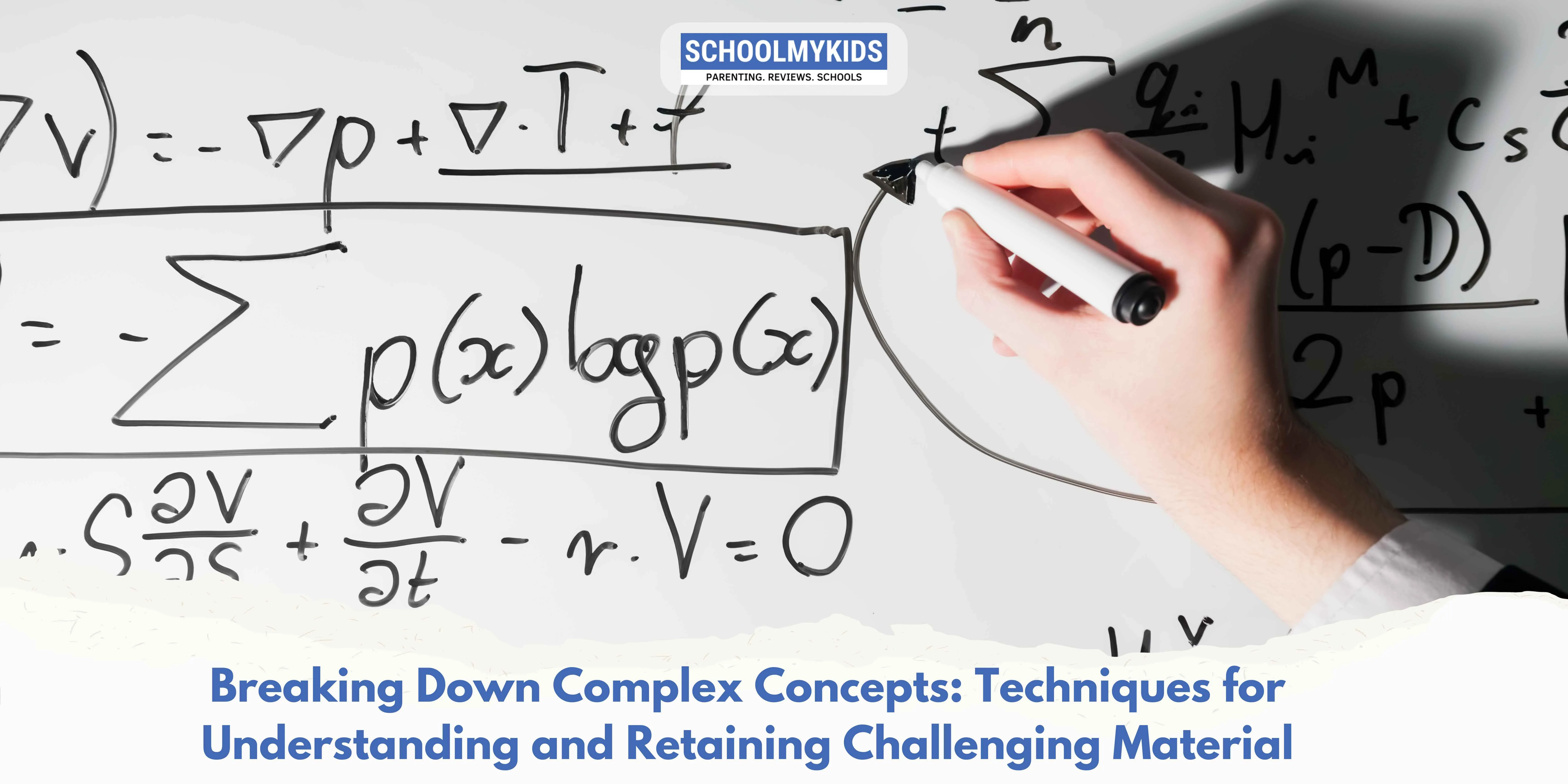Learning complex material can feel overwhelming, but with the right strategies, understanding and retaining difficult concepts becomes manageable. This article explores effective techniques for breaking down complex topics, backed by research on efficient study methods. Additionally, we recommend books, podcasts, and TED Talks to help students and lifelong learners master challenging content.
Effective techniques for breaking down complex topics
1. Start with the Big Picture: Understand the Context
Before diving into details, it's essential to grasp the broader context. When you understand how a complex concept fits within a larger framework, it’s easier to break it down into smaller, manageable parts.
- Identify the Main Idea: Summarize the main point in one or two sentences. Ask yourself, “What is the primary purpose or takeaway of this concept?”
- Explore Connections: Think about how the new concept connects to what you already know. Making these connections helps your brain relate the new information to familiar knowledge, making it easier to retain.
Research Insight: Studies show that “schema-building” — creating frameworks around information — can enhance comprehension and recall. According to research by the Educational Psychology Review, understanding a concept’s context aids memory retention by linking new knowledge to existing cognitive structures.
Book Recommendation: Make It Stick: The Science of Successful Learning by Peter C. Brown explains the science behind effective learning techniques, including contextual learning.
2. Use the Feynman Technique for Simplification
The Feynman Technique, named after physicist Richard Feynman, involves explaining a concept in simple terms. This technique forces you to identify gaps in your understanding and makes complex information more digestible.
- How to Use the Feynman Technique: The Feynman Technique is a method for learning by teaching: break down a concept in simple terms as if explaining it to someone new, identifying gaps in your understanding. This process helps reinforce knowledge and clarify complex ideas effectively.
- Why It Helps: Teaching or explaining a topic in simple language highlights the areas you truly understand and those that need more focus. This process helps reinforce the material and improve comprehension.
TED Talk Recommendation: The Power of Simple Words by Terisa Siagatonu highlights the value of clear, accessible language, emphasizing that simplification can improve understanding of complex ideas.
3. Break Information into Chunks (Chunking)
Chunking is a process of grouping information into smaller, manageable pieces, which is especially helpful for retaining complex material.
- How It Works: Divide the material into logical segments, like main ideas or steps. For example, if you’re studying a multi-step process, learn each step individually before linking them together.
- Apply Mnemonics: Mnemonics or memory aids, like acronyms, help organize information in your brain. For example, if you need to memorize a sequence of items, create an acronym that represents the first letter of each item.
Research Insight: The chunking method is supported by cognitive science, which shows that our working memory can hold only about 4–7 pieces of information at a time. Breaking complex information into chunks makes it easier to store and recall.
Book Recommendation: A Mind for Numbers by Barbara Oakley discusses chunking and other cognitive strategies for mastering complex subjects, especially in math and science.
4. Use Visual Aids to Enhance Understanding
Visual aids, such as diagrams, flowcharts, mind maps, and concept maps, are valuable tools for understanding complex information. Visualizing concepts can make abstract ideas more concrete and easier to recall.
- Mind Maps: Start with the main topic in the center, then add related subtopics branching out. This helps organize the concept visually and shows connections between ideas.
- Flowcharts and Diagrams: For processes and hierarchies, use flowcharts or diagrams to map out the steps or relationships. This approach simplifies complex processes into a clear sequence.
Research Insight: Research from the Journal of Educational Psychology indicates that visual learning techniques can improve recall by 65%, as they engage different parts of the brain, making learning more efficient.
TED Talk Recommendation: Mind Mapping – Tony Buzan explains how visual learning techniques like mind mapping enhance memory and comprehension, especially for complex material.
5. Practice Active Recall and Spaced Repetition
Active recall and spaced repetition are powerful techniques for reinforcing and retaining complex information.
- Active Recall: This involves testing your memory by recalling information without looking at your notes. Try summarizing what you’ve learned or use flashcards to quiz yourself on key concepts.
- Spaced Repetition: Review the material at increasing intervals over time (e.g., after one day, three days, a week, etc.). This technique combats the forgetting curve, which shows that information fades quickly without reinforcement.
Research Insight: A study published in Memory & Cognition found that spaced repetition significantly improves long-term retention, as it strengthens neural pathways associated with recall.
Book Recommendation: How We Learn by Benedict Carey explores effective study methods, including active recall and spaced repetition, backed by scientific research.
Podcast Recommendation: The Learning Scientist Podcast delves into effective learning strategies, covering concepts like active recall, spaced repetition, and other evidence-based study techniques.
6. Teach What You’ve Learned
Teaching forces you to consolidate and communicate knowledge, deepening your understanding. By explaining material to someone else, you reinforce your own comprehension and identify areas that may need more review.
- Study Groups: Join or form a study group where you can take turns teaching each other concepts. This collaborative learning approach helps clarify understanding while encouraging active engagement.
- Teach Yourself Aloud: Even if you’re alone, practice teaching the material aloud to yourself. This technique solidifies what you’ve learned and improves your ability to articulate complex ideas.
Research Insight: Studies show that teaching information improves retention by 90% compared to passive study methods. This phenomenon, known as the “protégé effect,” can be a powerful tool for mastering challenging material.
TED Talk Recommendation: Teach Teachers How to Create Magic by Christopher Emdin discusses the value of effective teaching strategies, which can be applied to self-study as a way to reinforce learning.
7. Create Analogies to Simplify Abstract Concepts
Analogies can make unfamiliar, complex ideas more relatable by comparing them to things you already understand. This technique helps bridge gaps in comprehension and allows you to create meaningful associations.
- Find Relevant Analogies: For example, if you’re studying the concept of electrical circuits, you might compare it to water flowing through pipes. The current is like water flow, and the resistance is like friction in the pipes.
- Use Everyday Examples: Relating concepts to everyday life makes them more accessible. For instance, you could compare the human circulatory system to a city’s network of roads, with the heart acting as the main hub.
Book Recommendation: Metaphors We Live By by George Lakoff and Mark Johnson explores how metaphors shape understanding and improve our ability to grasp complex ideas.
8. Incorporate Retrieval Practice with Practice Problems
Practice problems and real-world applications help reinforce theoretical concepts and improve your ability to recall and apply what you’ve learned.
- Apply to Real Scenarios: For each concept, try to come up with practical examples or case studies. Applying knowledge to realistic scenarios makes it more meaningful and helps reinforce memory.
- Work Through Practice Problems: If you’re studying STEM subjects or learning skills with defined procedures, practice problems are invaluable for reinforcing comprehension and improving recall.
Research Insight: The Testing Effect, supported by research published in Psychological Science, shows that retrieval practice, such as testing, significantly improves retention and helps identify areas for further study.
Podcast Recommendation: The Science of Success features episodes on effective learning techniques, including retrieval practice and the testing effect, to maximize information retention.
Recommended Books, Podcasts, and TED Talks
Here are additional resources that explore techniques for understanding and retaining complex material:
- Books:
- Peak: Secrets from the New Science of Expertise by Anders Ericsson — This book discusses deliberate practice and techniques for mastering complex skills.
- Deep Work: Rules for Focused Success in a Distracted World by Cal Newport — Newport’s book emphasizes deep, focused study as a pathway to mastering difficult subjects.
- Podcasts:
- The Tim Ferriss Show — Tim Ferriss interviews experts across fields and often discusses strategies for learning and mastering complex subjects.
- The EdSurge Podcast — This podcast covers educational technology and learning science, with episodes focused on innovative learning techniques.
- TED Talks:
- How to Learn? From Mistakes by Diana Laufenberg — This talk encourages learning through exploration and failure, which is particularly helpful for tackling difficult topics.
- Grit: The Power of Passion and Perseverance by Angela Lee Duckworth — Duckworth’s talk explores the importance of perseverance, which is crucial for mastering challenging material.
Conclusion
Mastering complex concepts is achievable with the right strategies, tools, and mindset. By breaking down information, using retrieval practice, teaching, and building a deep understanding through analogies, students can retain challenging material more effectively. Supplementing these techniques with insights from books, podcasts, and TED Talks can provide additional motivation and methods for efficient study, empowering students to achieve their learning goals with confidence.








Be the first one to comment on this story.